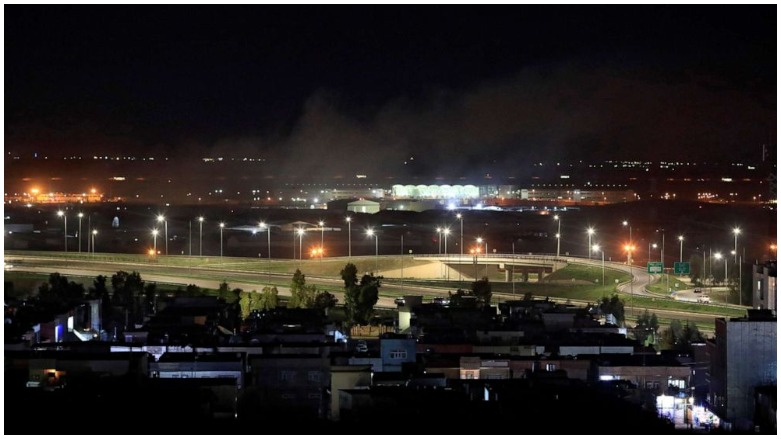Erbil rocket strike ‘definitely a terrorist attack;’ progress made on probe: Kurdistan PM

ERBIL (Kurdistan 24) – Kurdistan Region Prime Minister Masrour Barzani told a European television news channel on Saturday that this month's deadly rocket attack in Erbil should be characterized as a “terrorist attack” and that regional security forces are making significant progress on investigations into the incident.
In an interview with France 24, Barzani also covered a wide range of other topics relevant to the autonomous region of Iraq, including the ongoing threat posed by the Islamic State, territories disputed by Iraq and the Kurdistan Regional Government (KRG), and its federal counterpart, and clashes between Turkey and the Kurdistan Workers’ Party (PKK).
Erbil Attack
On Feb. 15, at least two dozen of rocket attacks targeted Erbil International Airport – home to US-led coalition personal – with some striking a residential area of the Kurdistan Region capital city. Several were wounded and two killed, including a Filipino military contractor and a civilian.
Read More: Several rockets land outside Erbil International Airport in late night attack
“It was definitely a terrorist attack to destabilize the [Kurdistan] Region,” Premier Barzani told the French channel on Saturday, specifying that investigations have led to “some good indications” on the groups responsible for the attack.
Barzani described the probe into the incident as “still unfinished,” saying that his government “prefers to wait” until the results are finalized to speak conclusively on who is to blame.
Soon after the attack, a group calling itself Saraya Awliya al-Dam claimed the responsibility for 107-mm rockets that were fired into Erbil.
“We cannot count on any of those claims. We have to wait for the results of the investigation to identify the perpetrators,” said Barzani.
The group appeared on the scene after a US drone strike killed top PMF leader Abu Mahdi al-Mohandis and celebrated Iranian military commander Qassim Soleimani in January 2020.
Such new groups, many security experts believe that existing militias have adopted shadowy new group names to provide a cover for their direct affiliation to the PMF and Iran.
In a response to a question by the French channel on whether these fighters are a threat to the stability of Iraq and the Kurdistan Region, Barzani said that he hopes that Iraq’s legal institutions gain effective control over all such forces.
“I cannot make a general statement about the PMF [as] they are different elements,” within the umbrella organization of militias, but stressed the importance of Baghdad being “able to bring everybody under the control of the legal system.”
ISIS remains a primary threat
Regarding the so-called Islamic State, Barzani said that the extremist group “still remains to be a main threat” to the security of the Kurdistan Region, Iraq, and the world.
The group's militants are “still out there and are reorganizing as we speak,” he warned, as the final defeat at the hands of Peshmerga, Iraqi forces, and US-led Coalition partners is still “unfinished business.”
In late January, the group claimed responsibility for a bloody twin explosion at a crowded outdoor market in central Baghdad that left over 30 dead and more than 100 wounded.
Disputed territories
The Kurdish premier called for security cooperation between “legitimate and legal forces” of Iraq’s federal government and the Kurdistan Region to fill the “security vacuum” in areas disputed by Baghdad and Erbil, where the Islamic State has routinely exploited the lack of security coordination to launch attacks against government and civilian targets.
“We have made proposals to the federal government of Iraq [and] we have had numerous meetings with officials to close that gap by bringing legitimate and legal forces to those areas including from the [Iraqi] federal government and the Kurdistan Region,” said Barzani.
“Fighting terrorism should not be deterred by any of these problems that we may face”, he said, referring in part to the coronavirus pandemic that has crippled governments worldwide.
Turkey-PKK clashes ‘exported’ to Kurdistan Region
In another part of the interview, Barzani spoke on recent clashes between Ankara and the PKK, involved in a decades-long conflict over Kurdish rights in Turkey that has once again intensified following Turkish air and land operations against the group inside the Kurdistan Region beginning in June 2020.
“First of all, this is not our problem; it is a problem inside Turkey which unfortunately over the years has been exported to our region,” Barzani said, adding that such fighting on the region's soil will not effectively end the conflict.
With regards to the presence of PKK in the Kurdistan Region, premier Barzani said that the group has “taken advantage of the goodwill of KRG authorities” by having “occupied mountains and residential areas,” severely impeding local governance and basic services.
“Sometimes farmers are denied access to their lands and sometimes they are even being deported from their villages,” Barzani said.
The clashes between Turkey and the PKK mostly take place in mountainous, rural areas of the Kurdistan Region, where the group is headquartered and where civilian populations depend on farming and livestock for their livelihoods.
“We hope that the PKK will realize that their military presence in these areas is not going to serve anyone,” Barzani said, adding that continued violent activity by its fighters “will not be tolerated by us.”
With regards to Turkish operations against the PKK, Barzani concluded, “We definitely support the sovereignty of our country and nobody wants the presence of any militaries, but there has to be no justification whatsoever for the intervention of Turkish forces.”
“At this time, the PKK is giving them that justification.”
Editing by John J. Catherine
